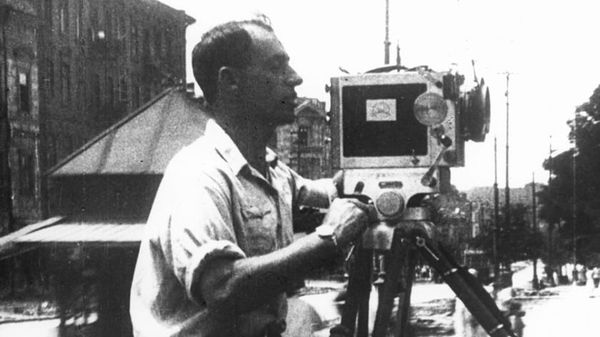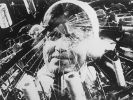Eye For Film >> Movies >> Man With A Movie Camera (1929) Film Review

Editor's Note: The following review is of the film with the score by Michael Nyman. The 2015 UK release features a score by the Alloy Orchestra, based on Vertov's notes from the 1928 premiere of the film.
Man With A Movie Camera is a joyful celebration of all things Russian at the end of the 1920s. Dziga Vertov invites us to see his homeland from his camera's perspective, beginning by showing us the camera in question and constantly intercutting footage of its position to make sure we are paying attention to his artistry.

This is less a story of city life, than an amalgamation of vignettes, each cleverly intercut to give us a feel for the frantic world of post-revolutionary Russia. Beginning as dawn breaks over the city, we watch the cameraman wake up and as he starts to stir so do the people of the town - or rather towns, as the film was shot in Moscow, Kyiv and Odessa. All human life is here, from tramps in the park to holidaymakers in Odessa practicing their swimming on dry land, with each individual's rituals entwined with the footage of another until dusk.
Thus, Vertov offers us footage of a couple signing their wedding certificate, followed by a second pair - less ecstatic - signing their divorce papers, and some quite startling shots of a woman giving birth, intercut with the procession of an open coffin.
It is clear from the outset that Vertov and his co-creator, cinematographer Mikhail Kaufman, who is the ubiquitous "man with camera", have a lot of tricks up their sleeves. We are treated to images of Kaufman seemingly setting up his camera in a glass of beer and later super-imposed on top of a building. Splicing is used to create kaleidoscopic effects and there is some very convincing stop-motion animation. The constant prescence of the camera serves to remind us that we are the voyeurs here and, also, that although Vertov is keen to boast about his homeland, he is even more keen to make us see the potential which moving pictures have to offer. Nothing is out of reach, from shots of an oncoming train, which appears to practically run Kaufman over, to animated prawns scrambling over one another on a plate. This is cameraman as documenter, magician and stuntman rolled into one.
Michael Nyman - perhaps best known as the composer for The Piano - has provided a new score to Vertov's silent work. On the whole, his upbeat orchestration adds much to the overall feel of frenzied activity and industry - although at times it seems to be somewhat more frenetic than the onscreen activity warrants. Certainly, the film feels better with music, as it has the tenor of a classical poem, moving lyrically between images which, at first, seem contradictory, although at second glance bear relation to one another. Nyman's score barely pauses for breath as we career along with Vertov's enthusiasm.
More than 70 years may have passed since the making of this film, but it still contains more innovation than many of the movies churned out by Hollywood today.
Reviewed on: 08 Sep 2002















